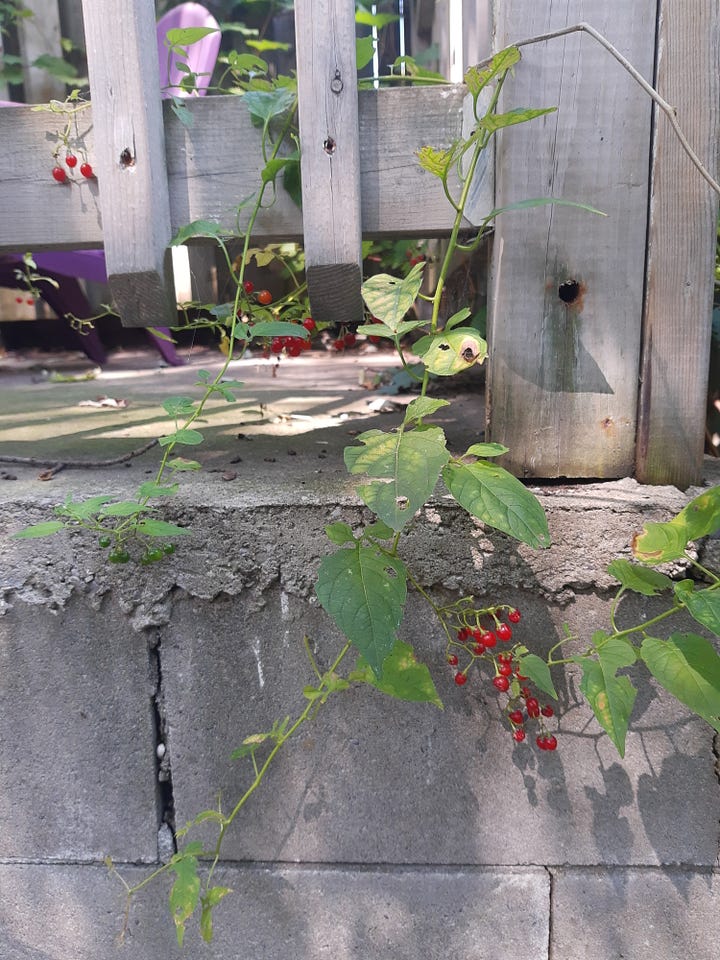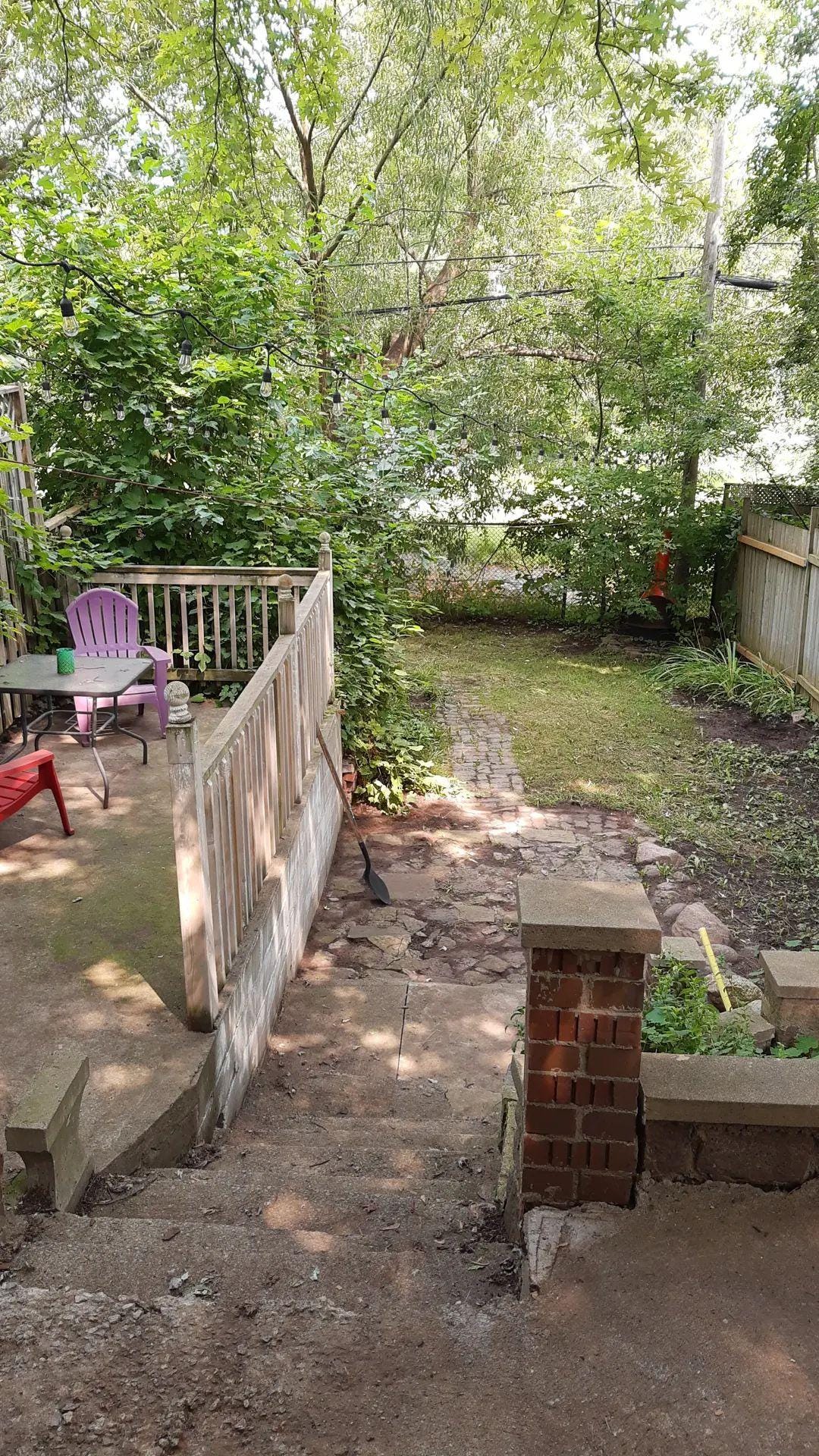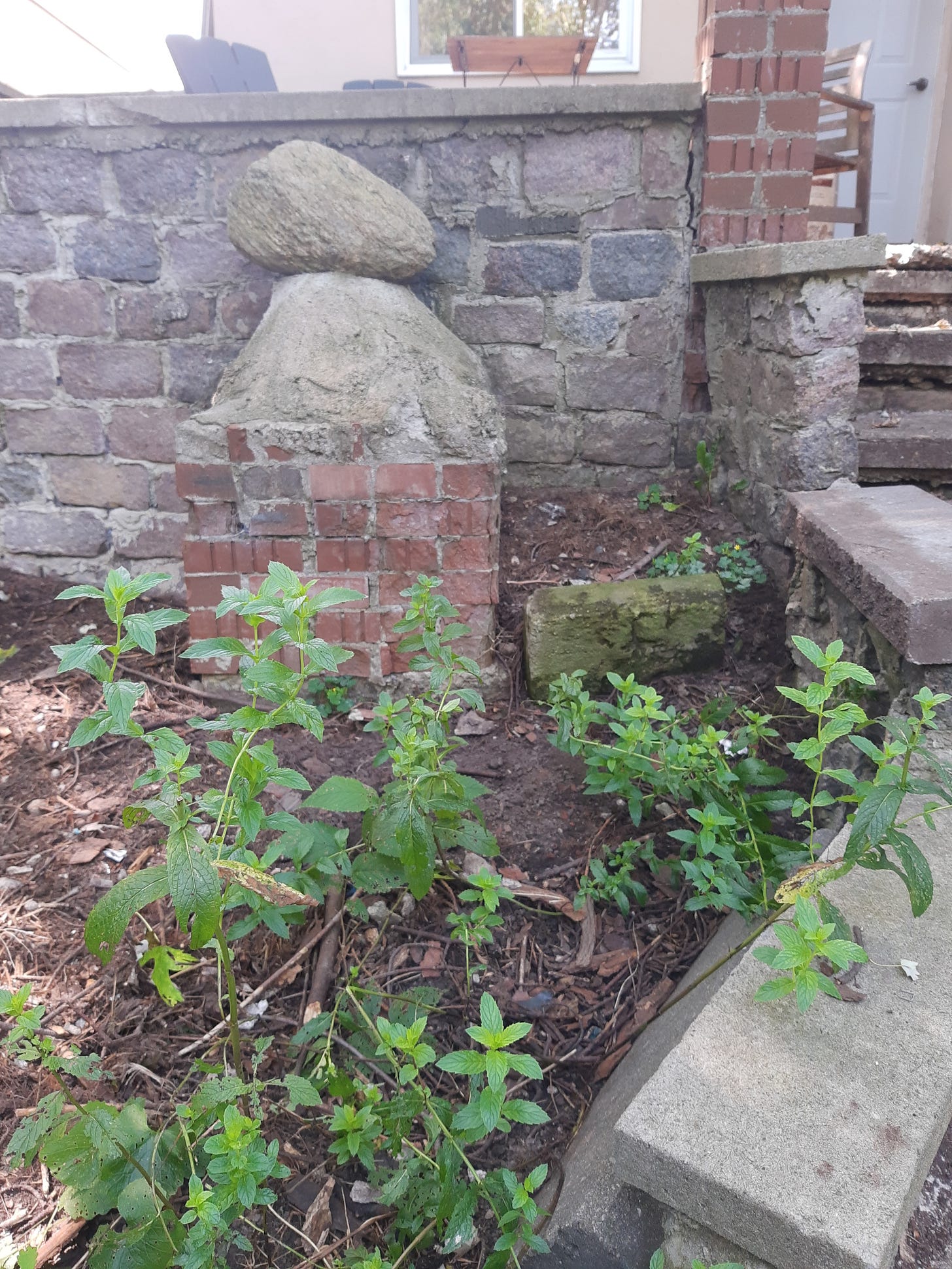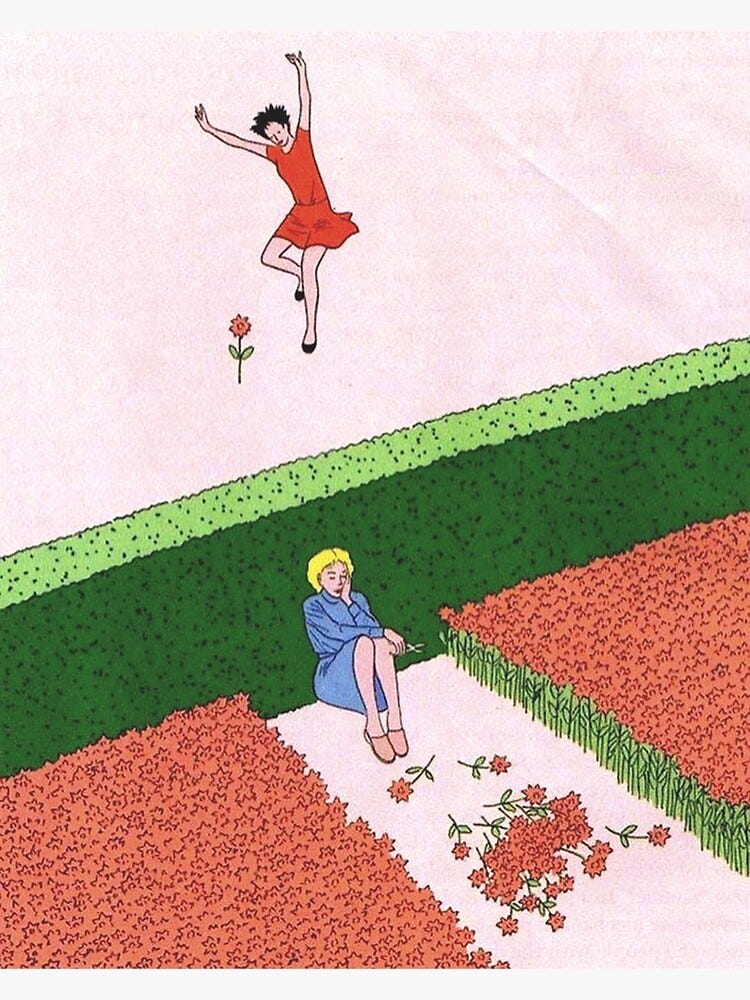Rooting out the vine
An update on my summer and my new identity as a Garden Person
Every writer must feel the call of a gardening metaphor from time to time, even one like me who, until this year, would say the only thing I knew about plants was how to kill one. But this August, I decided I would become a Garden Person.
This actually began percolating in May. When my school semester ended, I no longer had any reason to leave the house. During long days spent tapping away at my computer keyboard in the frosty AC-chill of my basement apartment, I started to forget it was summer. I decided to work outside.
So I began tapping instead beneath the shaded canopy of a thick-trunked tree, one of a line of three that douse my and my neighbours’ yards in luxurious shade. Shade is a treat in Toronto. On hot, humid days, the shade feels about 10 degrees cooler than the sunny spots. Warm summer rains barely penetrate the lattice of branches above my head. And then the humidity breaks and the sun comes through in swaying dapples dancing over my typing hands. The cicadas buzz in overlapping waves like electric pulses. The feral cats that visit my yard call, baby-like, to each other through the fence. Squirrels drop unripe fruit to the ground with happy thuds, from their perches in the tree and hydro pole at the end of the yard. Butterflies make lazy visits from bloom to bloom.
The more I saw the beauty in my backyard, the more its disrepair began to bother me as well. We rent, and we inherited this quirky yard, shaped by owners and tenants long gone. The park behind our house is built on an underground river and the soil is exceedingly moist. Things grow very fast, mostly weeds. When we first moved in, we didn’t even know there was a little stone pad and path in the yard; it was entirely covered by tall weeds. There’s a rusted-out chimenea that I’ve never attempted to use. A patch of tiger lillies bloom every summer, and an unkillable glut of spearmint fills one of the planter boxes each year.
There’s also a weird brick pile poured over with concrete and a buckling and uneven deck. (One of the former owners seemed to think the solution to most problems was more concrete.)
Still, I love this yard, and I’m inspired by its resilience, excited to see the growth shoot up every year and flush the whole thing with green. Even the weeds.
Except for one. When I decided to start caring about the garden, I discovered that our entire backyard had been secretly colonized by an invasive vine. It grows prettily along the fence, sprouting clusters of little red berries. But then it twists itself into the overgrown bush along our fence and the tree at the end of the yard, threatening to choke them out. It snakes under the soil, creating a dense web of roots and preventing me from planting anything new. It punched its way through the brick-and-concrete pad this year, showering brick fragments everywhere. This thing is powerful.
This summer I completed a twelve-week mentorship as part of my MFA program. At the same time, I signed a book contract for a different project, with a first draft deadline next July. Both of these things were amazing, wonderful opportunities. But my summer felt like a marathon. I was writing 5,000 words of a novel every week, researching for both projects, and starting to draft essays. I also had some weird unexplained chest pains (love that for me) which required numerous doctors’ visits to sort out and caused a couple panic attacks where I was convinced, George Costanza-style, that I was going to be stuck dead because I finally signed a publishing contract. (The real culprit seems to be acid reflux—stress??—and I am, fingers crossed, recovered.)
When July came to an end, my mentor wholeheartedly encouraged my plan to take a break from writing for a month before school starts up again in September. I thought I needed to take up some project or hobby to replace my strenuous writing schedule. She suggested getting very into natural wine, which I think is an amazing idea (next August’s project?). Unfortunately, the stomach medication that was helping my weird pain had me off alcohol for a few weeks, so instead I decided to make yard work my new personality.


I weed-whipped and mowed the out-of-control grass. I trimmed back the vine from the fence enough that we could have people over for a nice outdoor dinner. My partner restrung the café lights that a windstorm had knocked down. We found cute wooden deck chairs put out for free on a curb in Leslieville and lugged them home, wearing them like cumbersome backpacks. I thought about how happy the tiger lilies’ annual bloom makes me, and researched shade-loving perennials. I planted lily of the valley and ivy for ground cover. I grew basil and chocolate mint in pots outside, moving them to follow the only sliver of sunlight making its way into the yard throughout the day. I planted a lilac bush because it’s my favourite and it was on sale, even though it probably won’t flower in our shady yard. (But you never know!)
I planted radish seeds which quickly sprouted and then didn’t grow, and sadly troweled little anemic shoots out of the earth a month later. I planted cilantro seeds from a kind friend who packaged up little envelopes of seeds for me, labeling them “good for spring” and “good for fall.” They never came up but I’m going to try again anyway. I planted one random flower the garden centre was giving away for free; it wilted and dropped its petals, and then came back with two more little blooms, to my delight. I put the roots of grocery store scallions in an espresso cup of water on my window sill, and when they regrew long enough, planted them outside. I bought a mushroom growing kit and buried mycelium in straw and woodchips.
All this, successes and failures both, felt very satisfying after a solid few months of chugging away on long writing projects. But what felt best was getting rid of that vine.
August is probably not the best time to garden. Everything has already bloomed and flowered and withered away. I got everything so cheap (and free) at the garden centre because it was past the time when you’re really even supposed to plant it. But I adopted a spirit of not caring too much; for once, I thought, I won’t be precious about things. I’ll be unafraid of failure. When I dug into the soil and found it clogged with vine roots, I started tearing them out, first just pulling them with my hands, then clipping the thick ones. At first I was mad at them. I characterized this as my War on the Vine. I’d come inside, sweat-drenched and slicked with dirt, and update my partner on the battle’s progress. “I think I’m winning!” “It’s made an advance!”
As a lifelong pacifist I quickly ran out of war metaphors, and then rethought my position entirely. I still want the vine out of the places it’s overreached—I don’t want it to kill my precious tiger lilies or strangle the trees, but I have nothing against this vine living its life happily wrapped around my fence. The vine, actually, is thriving in the boggy shade of our yard, unlike many plants. I gained a begrudging respect for it. After all, what kind of calm strength does it take to slowly grow through a bank of concrete? What kind of reedy plant breaks through brick? One that is to be admired, I’d think.
Still, I’ve traced the vine’s more insidious strands to their sources, and I’ve been ripping up the roots. It’s extremely satisfying to plunge my gloved hands into the dirt and wiggle free the knob of root; clip it out; pull up the long, twisty strands, following them through the soil until they taper and burst free in a spray of dirt and scrub-wool-like tendrils. It feels good, after months of brain-work, to do something embodied; it feels good, after so much meandering through a fake world in my own head, to root out the problems and rake over fresh soil. It’s an irresistible metaphor.
Recently I saw this image attributed to the illustrator Guy Billout:
I felt an instant connection to the dark-haired figure at the top of the image. That is how I would like to be, with both my writing and my garden. Cultivating something, pouring my time and care in and celebrating when it blooms. I love the energy of the figure’s movement, the shock of her hair, the way the beauty of that little flower is only really visible when it’s disconnected from the pack. The bottom half is a good reminder, too, to look around more, recognize plenty when it surrounds you.
Today I hope to put some grass seed down over part of the yard that was previously a balding, patchy area clogged with weeds, where I tore out some of the vine tendrils. If even a single little blade comes up I’ll be dancing around it, celebrating. 🌱
Writing news and a call for interview subjects
I kind of skated over it above, but in case you missed it: I’m writing a book!
My essay collection, Jesusland, is forthcoming with ECW Press in fall 2025. It’s a look at the evangelical Christian pop culture of the 2000s that blends cultural analysis with humour and a little bit of memoir. I’m over the moon to be finally putting some ideas to paper that have been rattling around in my head, honestly, since I was a teenager, and to be edited by a writing hero of mine!
On a related note, I’m looking for people who grew up with sexual abstinence / “purity” teachings who might want to contribute to my research. I am hoping to do some written interviews, and would also love to simply chat about the project. So if this describes you and you feel like you might want to talk about your experience, I’d love to connect! You can contact me at joellekidd@gmail.com for more details.
Book corner
Some of my favourite things I read this month:
On the theme of this newsletter, Kyo Maclear’s new book Unearthing became a favourite the instant I read it. I’ve just finished her book Birds Art Life as well, and it was spectacular.
I’ve also been crowing about how good The Overstory is for weeks now, but I can’t help it—it made me cry and fall in love with trees. And I recently worked on The Language of Trees by Katie Holten, which makes a great companion piece: a very thoughtful and original compendium of tree-writing that reinforces just what we’re in danger of losing to climate change.
This month I read a near-perfect book: Cassandra at the Wedding by Dorothy Baker. I may be a bit slow on this one, since I think it gained renewed popularity a few years ago, but, hello?? Sharp, funny, acid-laced 1960s study of an emotionally enmeshed pair of twins?? One of which is gay and having an existential crisis?? On a beautiful ranch?? And the other one is getting married?? Why did no one tell me about this book? I wish I could go back in time and have read this at 17, but alas instead I just read The Catcher in the Rye 200 times.
My current very specific recommendation request:
The end of summer always feels like a lazy but sensorially-saturated time, which makes it perfect for poetry reading. I feel like a poetry neophyte, so I’d love some recommendations! What poetry books would you read slowly while stretched out on a blanket in a shade-dappled park?
Other links that may be of interest!
My friend and MFA colleague Michael Melgaard’s novel Not That Kind of Place came out yesterday! Pick it up at your local bookstore!
My appreciation for our shady yard reminded my partner of this great episode of 99% Invisible about the politics of shade in Los Angeles.
During my intentionally “unproductive” month, I’ve been thinking a lot about productivity as a concept. (I may have to revisit How to do Nothing soon!) This newsletter from tech writer Casey Newton has some interesting nuggets about how thinking works and the value (or lack thereof) of note-taking, AI, and productivity apps.
I attended a great zoom webinar called Word By Word (put out in conjunction with The Blacklist) that featured Charlie Kaufman and Boots Riley. Not sure if it’s available to watch online but it sounded like they had some more interesting screenwriter pairings coming up! Also, if you’re interested in lending support to the WGA Strike, they are collecting donations for the longstanding and very cool Entertainment Community Fund.
Banff is accepting applications for in-person and virtual writers’ sessions right now! I did a virtual one a couple winters ago and even though there was no gorgeous mountain scenery it was still an amazing experience. Apply, apply! :)





Grandpa would be so proud of you!